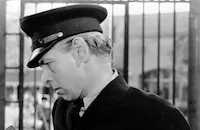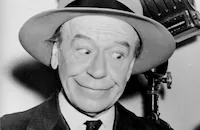Village Tale
Brief Synopsis
Cast & Crew
John Cromwell
Randolph Scott
Kay Johnson
Arthur Hohl
Robert Barrat
Janet Beecher
Film Details

Synopsis
In the rural town of Somerville, bully Drury Stevenson encourages his sullen brother Elmer to believe rumors that his wife Janet is having an affair with T. N. "Slaughter" Somerville, the local patriarch, whom Drury envies and despises. Although the rumors are untrue, Slaughter and Janet, whose refined sensitivity makes her an unlikely match for Elmer, spend enjoyable time together preparing for the church's annual revival meeting. Egged on by Drury, Elmer follows Janet to the church one evening and, as a group of townspeople watch from the woods, tries unsuccessfully to threaten Slaughter with gunshot. During the revival meeting, a humiliated Elmer shows up and demands that Janet return home with him. Although she obeys, Janet chooses that night to leave Elmer and seek refuge with elderly, kindly Ike. When the town gossips, headed by Drury, hear of Janet's desertion, they plot a chiveree and storm Ike's cabin to humiliate her. Slaughter, having learned about the chiveree from railroad worker Ben Roberts, rushes to Ike's and, with Ben, beats up the participants. Later, at the local gathering place, Drury accuses Slaughter of cowardice, a claim denied by Charlie, Slaughter's timid hired hand. For his words, Drury beats Charlie badly, but when Slaughter hears of the deed, he fights Drury and nearly kills him. The next day, when Charlie's drowned body is found, Drury is accused of murder. At first Slaughter refuses to supply his enemy with an alibi but, nagged by his conscience, later clears him. As the town drives out Drury, Ike talks Elmer into deserting Janet, who is then free to marry the man she has always loved, Slaughter.

Director

John Cromwell
Cast

Randolph Scott

Kay Johnson

Arthur Hohl

Robert Barrat

Janet Beecher

Edward Ellis

Dorothy Burgess

Donald Meek
Andy Clyde

Guinn Williams
Ray Mayer
T. Roy Barnes

Dewitt Jennings
Crew
Carroll Clark
Alberto Colombo
David Hempstead
Kenny Holmes
William Morgan
Nick Musuraca
Walter Plunkett
Van Nest Polglase
Clem Portman
Frank Redman
Allan Scott

Film Details

Quotes
Trivia
Notes
According to a January 1935 Hollywood Reporter news item, Paramount originally controlled the rights to Phil Stong's novel and intended to use the story as a vehicle for Cary Grant and Evelyn Venable. After RKO bought the rights from Paramount, Helen Broderick was announced as the film's star. Hollywood Reporter news items add Brenda Fowler, Charles Bennett, Wade Boteler, Otto Fries, John Hyams and John Beck to the cast, but their participation in the final film has not been confirmed. According to Hollywood Reporter, Janet Beecher was brought from New York by RKO for her appearance in the film. RKO borrowed Randolph Scott from Paramount and Arthur Hohl from Columbia for this production. Kay Johnson was married to John Cromwell at the time of filming. Reviews (but not the film) refer to the setting of the story as Iowa. According to a modern interview with screenwriter Allan Scott, Marc Connelly wrote the first draft of the script. Scott also recalled receiving one fan letter for the film, from Eugene O'Neill, who wrote, "This is the stuff to feed the troops."












